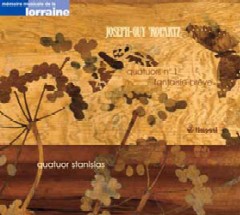Classica-Répertoire (June 2008) Note: 8/10
« The Stanislas Quartet has finished its integral recording of the six Ropartz quartets, the first two volumes of which have already been published. The Quartet N° 1 in G minor is a wide-ranging work (43 minutes) in keeping with the « franckist » tradition (...) The quartet in G minor is built on these principles, except here a quasi-symphonic touch, a post-Wagnerian chromatisme is favoured. For my taste the work is unequal, although the basic thematic material has quality (...).
The preceding year, Ropartz had dedicated a Brief Fantasy to his friend Magnard. The work is pleasant, although of a very formal structure. It has remained hitherto unpublished, thus practically unknown.
The Stanislas Quartet, of whom we have already spoken of very highly in these columns, here puts the finishing touches to an important work in defence of a little-known composer whose brilliance is at last being recognised.
Jacques Bonnaure
Diapason (July-August 2008) 5 diapasons
« We have come full circle: the first of Ropartz' six quartets ends the enthralling integral recording undertaken by Timpani in 2005. To complete a rather scanty timing, the editor has had the excellent idea of adding a Brief Fantasy hitherto unpublished, the first foray of the composer into the string quartet genre (....). Without doubt the purposely tender and deeply involved performance of the Stanislas Quartet is well suited to the situation. It is not less so in the « real » quartet, solidly structured, which was composed the following year, following close on the heels of the venerated master, César Franck, and his main disciple, Vincent d'Indy. The work has a lot of character and a certain emotional force and reveals already a very skilful and personal integration of musical folklore ».
François Laurent
AMAZON US (September 2008)
" (...)The Ropartz's first quartet is dedicated to d'Indy. It is a big ebullient work, bursting with invention yet far from iconoclastic. It stands somewhere between Franck, Beethoven and folk-nationalism. There is a very moving and inward Assez lent (III) and a wildly lurching mood-tornado of a finale - almost a Gallic Francesca da Rimini. TheStanislas has a piercing, resinous and poignant sound rather than anything luxuriant. This seems to suit the music very well (...) Both works are so lavishly open-handed with invention that one is reminded of the young Sibelius for whom ideas sprang forward in almost frightening profusion. "
Rod Barnett
STRAD MAGAZINE ( London, October 2008)
“This CD completes a traversal of his six quartets by the Stanislas Quartet, which is based in Nancy, where Ropartz was active at the beginning of the 20th century as director of the conservatoire (...)
The Stanislas players (members of the Nancy Symphony Orchestra) are well within the musical idiom. Truthfully recorded in a friendly acoustic, they do Ropartz's work proud in a technically sovereign, musically convincing performance.”
Carlos Maria Solare
 issued in april 2008
issued in april 2008


